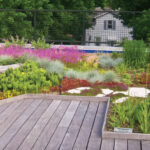Sustainable landscaping is becoming increasingly important as people strive to minimize their environmental impact. By using eco-friendly practices and materials, homeowners can create beautiful outdoor spaces that are both aesthetically pleasing and environmentally conscious.
One key aspect of sustainable landscaping is water conservation. This can be achieved through the use of drought-tolerant plants, rain barrels, and efficient irrigation systems. By reducing water consumption, homeowners can save money on their water bills while also helping to preserve this precious resource.
Another important aspect of sustainable landscaping is the use of native plants. These are plants that are indigenous to a particular region and therefore require less water and maintenance compared to non-native species. By incorporating native plants into their landscapes, homeowners can create habitats for local wildlife and support the biodiversity of their area.
In addition to using native plants, homeowners can also implement practices such as composting and mulching to improve the health of their soil. Composting organic materials like food scraps and yard waste can enrich the soil with valuable nutrients, while mulching helps to retain moisture and suppress weeds. These practices not only benefit the environment but also promote the long-term health of the landscape.
Sustainable landscaping also involves reducing the use of chemical pesticides and fertilizers. These substances can harm beneficial insects, pollute water sources, and degrade soil health. By opting for organic and natural alternatives, homeowners can create a healthier environment for themselves, their families, and the surrounding ecosystem.
Lastly, sustainable landscaping includes proper maintenance practices to ensure the longevity of the landscape. This includes regular pruning, mowing, and weeding to keep plants healthy and prevent the spread of pests and diseases. By taking a proactive approach to maintenance, homeowners can reduce the need for costly and harmful interventions in the future.
















